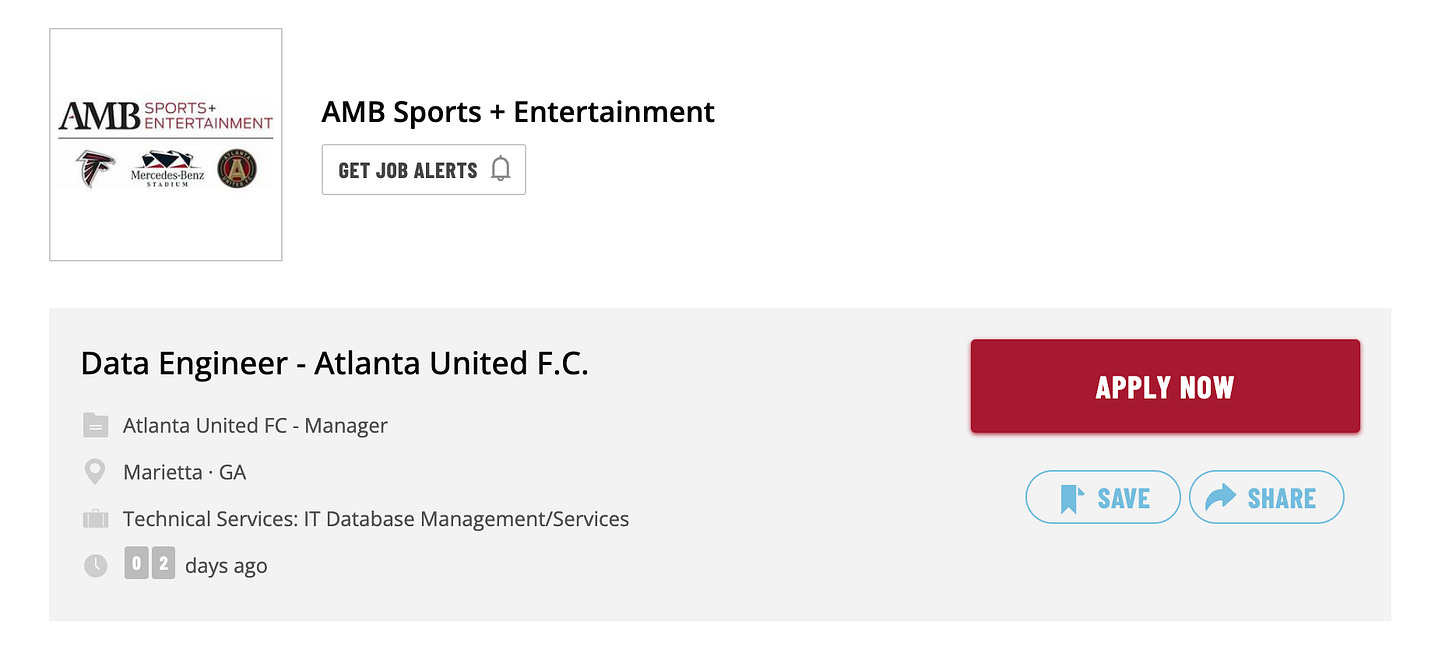Breaking Down a Sports Analytics Job Posting
A three step process to help you figure out what to focus on
A question I get a lot is “What skills should I be focusing on to work in data/sports?”.
Many people are confused about what they should know and don’t actually have the skills needed to work in data, but they apply for jobs anyway.
If you read job postings, it’s pretty easy to pick up on what organizations, clubs, teams, companies, etc are all looking for.
I came across this job (link might be removed depending on when you are reading this) from Atlanta United, an MLS soccer team, for a data engineer.
Let’s go through my three-step process of breaking down this job listing to figure out what we should be focusing on and where we might fall short in terms of skills needed and knowledge.
Step 1: The job description
A lot of people skip this section and just go straight to what the skill requirements are.
Big mistake.
The job description gives you some key information.
What is the job title
Key job functions
Where the job is located
In this job description, we see that it is:
A data engineering job
Key functions are working on ETL pipelines and maintaining & building web applications
It is based in Marietta, Georgia
You can learn a lot from just reading the job summary section because this is where they usually are going to put the really key stuff. There’s not going to be a ton of fluff and unnecessary requirements here.
From this, we learn we probably need to have some knowledge of ETL & web applications.
Also, if we aren’t willing/able to move to Marietta, Georgia it’s probably a waste of time. Location can be a pretty big factor so that’s something a lot of people take for granted.
Step 2: The responsibilities
From this section you can get a good grasp on the tools you’ll be using, the teams you’ll be working with, and tasks you’ll be given.
Sometimes, a lot of these responsibilities are pretty vague or general, but it’s in the specific ones that you can find out more about what you should be focusing on learning.
In this one, we see some of the same stuff from the job description but now we also have some tools:
Microsoft SQL Server
Microsoft Azure
R
As well some new job responsibilities:
Architecting data storage solutions
Data Confidentiality
Maintinaing and updating packages in R
This gives us even more insight into the job and as well where we may be lacking in skills.
3. The required skills
The skill section I take mostly with a grain of salt but there’s usually some good stuff in there.
The reason for taking it not as seriously as the previous two sections is there’s always a lot of fluff/vagueness in some of the requirements.
Also, a lot of listings say a college degree is required, but if you are good/skilled enough then that usually isn’t a deal breaker.
If we look at this section though we get some more key insights.
This is going to be a SQL and database-heavy job (If you want to learn SQL & Databases, you can check out the course I’ve created to help you learn)
You’ll need to know some cloud computing
Python & R are also going to be used a lot
If I looked through this and I didn’t know what a technical term was, that would be a good place to start especially if I saw it popping up in multiple job listings.
For example, if you don’t know what Databricks is, then that’s a good place to start researching and seeing what there is to learn about it.
Wrap up
Overall, the job postings actually can help you learn a lot about where you might be lacking when it comes to skills.
Especially when you start to analyze multiple listings you can start to see patterns of what really matters and what doesn’t.
Until next time,
McKay








You break this down well to the essential parts. Thank you.